|
|
|
Sort Order |
|
|
|
Items / Page
|
|
|
|
|
|
|
| Srl | Item |
| 1 |
ID:
108082
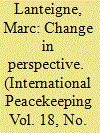

|
|
|
|
|
| Publication |
2011.
|
| Summary/Abstract |
To understand China's change in position regarding UN peacekeeping, the country's internal debates and policy towards the UN operations in East Timor from 1999 to 2002 comprise an essential case study. Despite its traditional concerns about the sanctity of state sovereignty, China was willing to support and contribute personnel to East Timor peacekeeping missions. This was a result of its growing confidence in addressing regional strategic issues, its development of the 'New Security Concept', which encourages cooperative solutions to strategic issues, and its desire to remake its regional identity to reflect a more conservative and pragmatic approach to regional peacebuilding. This change in policy not only allowed China to become more at ease with UN peacekeeping participation, but also contributed much to the country's Asia-Pacific diplomacy, which increasingly stressed multilateralism and partnership.
|
|
|
|
|
|
|
|
|
|
|
|
|
|
|
|
| 2 |
ID:
065091
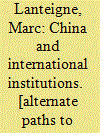

|
|
|
|
|
| Publication |
London, Routledge, 2005.
|
| Description |
ix, 230p.
|
| Standard Number |
0415365848
|
|
|
|
|
|
|
|
|
|
|
|
Copies: C:1/I:0,R:0,Q:0
Circulation
| Accession# | Call# | Current Location | Status | Policy | Location |
| 050011 | 327.51/LAN 050011 | Main | On Shelf | General | |
|
|
|
|
| 3 |
ID:
108075
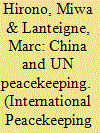

|
|
|
|
|
| Publication |
2011.
|
| Summary/Abstract |
After many decades of eschewing participation in UN peacekeeping missions, the People's Republic of China has since the 1990s rapidly reversed its critical stance and become an enthusiastic supporter of and contributor to several different types of UN missions including, some that have involved non-traditional peacekeeping. Evolving Chinese peacekeeping policy has suggested that despite the country's widely acknowledged rise to great-power status, within UN peacekeeping it still takes on the role of a middle power in its preferences for multilateralism and 'norm-taking'. Although China has stated that it wishes to continue its deep engagement in UN peacekeeping within its established norms for the near future, its presence as a rising power has prompted much new debate on how the country will tacitly and directly shape peacekeeping policy.
|
|
|
|
|
|
|
|
|
|
|
|
|
|
|
|
| 4 |
ID:
082182
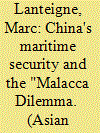

|
|
|
| 5 |
ID:
167330
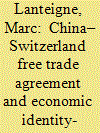

|
|
|
|
|
| Summary/Abstract |
The free trade agreement signed between China and Switzerland in 2013 was a watershed event in the economic policies of both states, a successful identity-building exercise for both actors in addition to an economic endeavour. In the case of Beijing, the Switzerland free trade agreement (FTA) was a crucial step not only in promoting its trade interests in Europe, including the European Union, but also in planning future FTAs and promoting China as a supporter of globalization and economic liberalisation. For Switzerland, the FTA further cemented that country’s identity as a distinct European economic and political actor, including in its engagement of the Chinese market.
|
|
|
|
|
|
|
|
|
|
|
|
|
|
|
|
| 6 |
ID:
088227
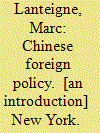

|
|
|
|
|
| Publication |
New York, Routledge, 2009.
|
| Description |
xi, 163p.
|
| Standard Number |
9780415465236
|
|
|
|
|
|
|
|
|
|
|
|
Copies: C:1/I:0,R:0,Q:0
Circulation
| Accession# | Call# | Current Location | Status | Policy | Location |
| 054196 | 327.5122/LAN 054196 | Main | On Shelf | General | |
|
|
|
|
| 7 |
ID:
123109
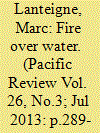

|
|
|
|
|
| Publication |
2013.
|
| Summary/Abstract |
Since China agreed to join the international counter-piracy coalition in late 2008, a watershed development in Chinese strategic policy, Beijing's engagement in Somalia is now following two separate streams. First, China is seeking to engage Somalia as part of its expanding number of African diplomatic partners via its participation in the coalition. Second, China is attempting to demonstrate, on the international level, its growing commitment to developing its naval capabilities, and protecting its maritime trade interests, by engaging in multilateral and coalition-based operations, namely to combat piracy off the Somali coast, in order to deflect criticism from the United States and its allies of China's overall military expansion and modernization.
|
|
|
|
|
|
|
|
|
|
|
|
|
|
|
|
| 8 |
ID:
165143


|
|
|
|
|
| Summary/Abstract |
Since 2011, Myanmar has undertaken a series of domestic and foreign policy reforms, including democratisation and peacebuilding, before and after the watershed November 2015 elections in the country. These reform processes have called into question whether China, which has been Myanmar's dominant great power neighbour throughout the previous era of military government in the country formerly known as Burma, would find its strategic position eroding as Myanmar further opens to the international community. However, the concept of China ‘losing’ diplomatic ground to other actors, including the West, in Myanmar implies a zero-sum game that does not adequately address Beijing's still-formidable geostrategic presence vis-à-vis its southern neighbour. China has now started to implement a more multi-faceted, ‘resilience network’-building approach to maintaining its special status in Myanmar's foreign policy, a situation which will persist as Myanmar continues its uncertain path towards further reform.
|
|
|
|
|
|
|
|
|
|
|
|
|
|
|
|
|
|
|
|
|